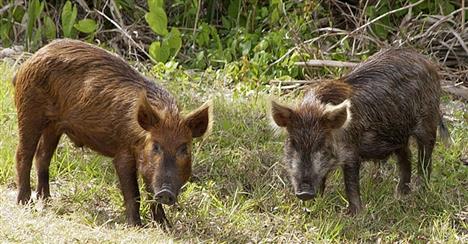Arkansas Department of Agriculture receives $650,000 for feral hog eradication efforts
by May 23, 2022 8:13 am 1,874 views

The Arkansas Department of Agriculture will receive $650,000 in federal funds to aid in its feral hog eradication efforts. The money will come from the Consolidated Appropriations Act of 2022.
The Buffalo River Conservation Committee (BRCC) allocated another $74,960 to the U.S. Department of Agriculture’s Animal and Plant Health Inspection Service Wildlife Services to expand eradication efforts within the Buffalo River watershed.
“We appreciate the efforts of U.S. Sen. John Boozman and the BRCC to provide additional resources that will enable the Department and our partners on the Arkansas Feral Hog Eradication Task Force to expand efforts to remove more feral hogs from Arkansas’s croplands, pastures, forests, and wetlands,” said Arkansas Secretary of Agriculture Wes Ward.
The Arkansas Department of Agriculture will use the federal funds to work with USDA Wildlife Services to implement a statewide feral hog management plan. These efforts will supplement ongoing removal activities, including eradication efforts in 12 Arkansas counties funded through the USDA Natural Resources Conservation Service’s Feral Swine Eradication and Control Pilot Program.
USDA Wildlife Services will use the funding from the BRCC to purchase additional traps and other equipment to expand trapping efforts within the Buffalo River watershed.
Approximately 30,000 feral hogs have been removed from the state by members of the Feral Hog Eradication Task Force since January 2020. The Task Force was created by the Arkansas legislature in 2017 to create a plan for the eradication of feral hogs in Arkansas and is made up of 21 federal and state agencies and non-government organizations.
Feral hogs are an invasive species that are especially destructive to agricultural crops, native wildlife, and young domestic livestock. In Arkansas, the latest survey by the USDA estimated that feral swine cause at least $41 million in agricultural damages every year, including $34 million in damages to soybeans, corn, cotton, wheat, hay, pecans, and rice, and $7.3 million in damages to livestock.
The feral hog removal efforts over the past two years have assisted more than 650 individual private landowners and public properties across the state, including within the Buffalo River Watershed. Members of the task force have also hosted eight landowner workshops to raise awareness of the damages caused by feral hogs and available resources to assist with removal.
Feral hogs are found in 39 states and may carry at least 45 bacteria, diseases, and parasites, including pseudorabies and brucellosis. Nationally, feral hogs are estimated to cause more than $2 billion in damages each year.
